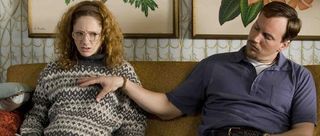Interview: Barry Munday's Patrick Wilson, Judy Greer And Chris D'Arienzo

In the Chris D’Arienzo film Barry Munday, the title character, played by Patrick Wilson, has to have his testicles removed when a man bashes a trumpet into his crotch – and that’s only the tip of the iceberg when it comes to weirdness. Based on the book Life is A Strange Place by Frank Turner Hollon, this independent is packed to the brim with quirkiness, hysterical moments and terrific performances by both Wilson and co-star Judy Greer.
Sitting in on a roundtable with D’Arienzo, Wilson and Greer, the conversation was much like the movie: never too far from veering off into the abnormal. In addition to talking about the making of the film and creating the characters, the three discuss what it’s like to work without Spanx, accepting jobs in superhero costumes and genital mutilation. You know, the stuff most junkets aren’t made up of. Check out my interview with the folks of Barry Munday below,
How did you manage to get such a dream cast?
Chris D'Arienzo: I know, right? I don’t know. I was one of these really great things. I wrote the script and the script kind of found its way into different agents who embraced it and then all of a sudden it was this crazy embarrassment of riches. It was literally weeks of me going, “Really? They’ll do it? Oh, cool!” When I wrote this I thought it’d be me and my buddies shooting it, I didn’t dare dream that it would be this cast.
Were there other actors considered for the parts?
Patrick Wilson: Hey! Hey! Woah! What the F?
CD: [sarcastically] You mean what was my dream cast? [laughs]
CINEMABLEND NEWSLETTER
Your Daily Blend of Entertainment News
Judy Greer: There were a few other manifestations of the film.
CD: It’s one of those things. Anytime you’re trying to put any kind of movie together you go through these periods where it’s like…for a while the film was based on foreign pre-sales, so it was like, “Here’s your list of actors that you can pick from that will get your movie made.” So you’re weirdly casting a movie based on what someone in Turkey will want to see two years from now. So it was this very strange way to cast a movie, which happens to a lot of films where it’s like you have to fit round pegs into square holes to kind of make sense of your movie, because the foreign sales person in Greece really loves “this actor” even though they’re completely wrong for it. This movie went through periods when it was doing that and then at one point one of the producers who was controlling the project, Matt Weaver, said to me, “You know what? Let’s just make the movie you want to make. Let’s just go to actors that you really want to go to.” And that’s when we all started working together. I just looked at people I really wanted to work with, whose work I admired, and we just went after them. And it was kind of amazing how everyone jumped on board.
JG: And those people weren’t available… [laughs]

The other side of that question, how did you guys [Wilson and Greer] come to the project?
PW: I was sent the script and I thought it was great but crazy and within about five minutes of talking to Chris on the phone…
CD: Which he did in a superhero costume, because he was on the set of Watchmen. I discovered that halfway through the conversation and I was hearing all this rambling, I was like, “Are you talking to me in a superhero costume?”
PW: He had all these great ideas about not only the way he wanted to shoot it but the music, and I felt just like he had the right tone, he knew exactly what he wanted to shoot. And it was a very easy sell. For me, sort of selfishly, it was a new… I didn’t have a chance to do a lot of comedy, he was game for really going as far as you wanted with the character and making a real bold statement. I didn’t want one of my first forays into comedy to just be the straight, boring man, everyone else around me is funny. That wasn’t really of interest to me. And just the fact that his style of how he wanted to shoot it, because at the end of the day, whether it’s a big movie or a small movie – it seems like a basic thing to say but it happens all the time – I think we’ve all worked with directors, and it doesn’t matter if you have a million dollar budget or a $100 million dollar budget, if they don’t know exactly how they want to shoot it the movie will just die on the vine. And we’re just real fortunate that he knew exactly how he wanted to do it. So it was very convincing and very easy.
Specifically, Patrick, what did you enjoy about playing Barry, and Judy, what did you enjoy about playing Ginger?
JG: Ginger, I loved that I got to be unattractive, I loved that I got to be very acerbic and caustic.
PW: Nice!
JG: I liked that I wasn’t a super likeable character and I didn’t have to try to win anyone over. It was also really nice to also not have to wear Spanx at work.
PW: What are Spanx?
JG: Like a girdle.
CD: They’re great.
PW: Oh, really?
JG: Like a new kind of girdle that sucks everything in.
PW: I need one.
CD: I’ve got two on.
JG: That’s what I liked about her. Telling a real story about a real person, not like an attractive person, who you’re like “Why would…
PW: “I don’t buy them being lonely.”
JG: Yeah.

And how about you, Patrick?
PW: I just loved creating him from the ground up. In the book, Life is a Strange Place, that it’s based on, he’s a little more straight-laced. He’s a little less colorful, let’s put it that way. Cause all these wacky things happen around him and usually that’s a very typical kind of formula: you have the sort-of everyman and everyone around him is crazy and he’s your barometer of what’s normal. What I wanted to do with the character, and Chris and I had the same idea for it, which was to make him as outlandish as everyone else was. Because you felt like the story was supported by a kernel of real truth and a real love story, albeit a quirky one. So you felt like you could go as far as you want. He was really created around three people in my life that I knew, so the physicality and a couple of things, the little –isms that we say, would just sort of give him an identity. And that was fun; creating the whole look was exciting in itself and making him look so wonderful.
JG: Having bangs.
PW: There’s nothing like having bangs with thin hair.
CD: That was one of the first things I remember, before we had met in person we had talked over the phone, I got this email one day and none of the facial hair was in yet, but he had just been practicing the bangs.
PW: Well, I was coming off of Dan Dreiberg so I was pretty much into the side-part, and combing it down was pretty sweet and terrible.
CD: And then taking all of your side burns off.
PW: You know when you see those guys and their sideburns are just a little too high? You don’t need to have sideburns, but don’t have to have them right above the ear. I knew a guy that did that in high school and I was like, “What are you doing? Just let them down a little.”
Who were the people that you drew inspiration from for Barry?
PW: There are three very specific people but I will never tell them, because they will all deny it. And they’ve all seen the movie, they’re like, “That guy’s an asshole!” [laughs] “That was you.” None of them true Barry. Like, I have a friend who’s just sometimes a little awkward, his arms will sort of dangle from his elbows, almost like a gorilla – he’ll sort of lead with his chest a little bit. So he sort of became that. Another guy sort of sits around nodding, agreed with everything everybody said. Very positive, there’s nothing negative about him, that’s one of the things that I think is so cool about him.
CD: Another fun thing to watch, because we didn’t shoot it chronologically, was there would be a moment before each take with him where I’d watch him process where he was in the recovery of his testicles. He’d kind of physically get there and figure out the walk as to how gingerly he would be – no pun intended – walking, which was always sort of fun to watch before we actually shot.

Is this the first thing that you’ve adapted into a screenplay, Chris?
CD: Yes. It was interesting. I don’t know how most people do it. It was the easiest thing I’ve ever written, it just really kind of flowed really fast. The first thing did was I took the novel and long-hand on legal pad – I was on tour with a band, so every city we’d be in I would wake up in the morning and go to a coffee shop and take it chapter by chapter and just convert the novel into a screenplay form on legal pads. Because I write on legal pads anyway, so I had this big binder by the end of the tour that was the screenplay to the novel and then put that on my computer. And then, once it was in screenplay form, then I could really see what didn’t work for the film or what things we really wanted to concentrate on. At the end of the day it was really about pairing away a lot of the wackiness to get to the relationship. It was fun.
Patrick, between Hard Candy, Little Children and now Barry Munday, there seems to be a pattern developing in your movies dealing with genital mutilation. Care to comment?
PW: I’d even go a step further and say that Dan Dreiberg is emotionally…
JG: In Watchmen are you impotent?
PW: Yeah, that’s what I just said.
JG: Oh, your character.
PW: Yes, but this is the only movie where I actually have my testicles chopped off. I like to live around this area [makes hand motions], from here to here, and from here to about here. All my movies rotate around that. [To Judy] Do you like that?
JG: No. [laughs] I’m not looking down there.
PW: You have to look when I point.
Judy, you had some great scenes with Chloe Sevigny. What was it like getting that sister dynamic down?
JG: Well, we’re helped by the fact that we’re so different character-wise. The two are so different but they get each other. It’s easy for me, I genuinely got along with Chloe, we had fun and got to know each other and both we’re excited to meet each other and work with each other. I guess we just used that. It was pretty simple, though, and it was nice to have one kindred spirit for Ginger in the movie. Even though there’s this weird competition thing Chloe’s character has, it didn’t really affect Ginger at all.

What do you guys have coming up next?
PW: I just had a film at Toronto that got picked up, a horror film that Sony bought. We’ll see when they want to put it out, I don’t know yet. And Morning Glory, a romantic comedy.
JG: Ooh, that’s right, with Rachel McAdams. That looks so good! I saw that trailer and I was like “Oh!” I’m so excited, I forgot you were in that. Yay! It’s a great role for Harrison Ford too.
PW: He’s great, she’s great, Diane Keaton’s really funny.
JG: You’re you.
PW: I really am in that movie, I don’t do anything. [laughs]
The movie that just got picked up, that’s Insidious with Rose Byrne. Watching the trailer it seemed as though it had a vibe like The Others, is that accurate?
PW: There’s a bit of Poltergeist, maybe Exorcist, bit of haunted house films. I think what James [Wan] and Leigh [Whannell], what they like to both honor and attack is that genre, like they did with Saw, when they redid that gore genre, and with this there’s no blood and guts whatsoever. Like [Barry Munday] is really to 70s comedies, a real nod to those classics. Those types of horror films were character driven. For this one, half of it is this kind of haunted house movie but then we move. It just takes something in the genre that doesn’t usually happen and then try and change it. A little Sam Raimi in there too, weird sense of humor. Horror fans are like, “I see Sam Raimi, I see this, I see that,” so that’s cool. I really liked it and we shot that in like 20 days.
JG: Is it safe to say home is where the ghost is? Like, it doesn’t matter where you live, home is where the heart is.
CD: That’s the tagline: “Home is where the ghost is.” You should be in marketing. [laughs]
PW: Just not on any of my movies. [laughs]

And what about you, Judy?
JG: I have a part in Love and Other Drugs which will be out in November and then I was in a movie at Toronto called Peep World that got bought by IFC. I don’t know when they’ll release that. Henry’s Crime, but I don’t know when they’ll release that either. So I have these movies, they’re awesome, they’re all going to come out, I just don’t know when. Except for Love and Other Drugs for sure is in November. And that one’s going to be good because I saw the trailer for that too and I was like, “That looks so good!” and then I was like, “That’s my movie!” [laughs] I got so excited. Totally a movie I would watch, cry alone while I watched.
CD: Good to know the trailers actually work.
What about you, Chris? What are you working on?
CD: I did this stage musical Rock of Ages so I’m still doing some of that and now I’m developing a new stage musical. Doing one with [Patrick Wilson] actually.
PW: Dipping my toe in that world.
What’s it about?
PW: Can we say?
CD: I don’t know if we can say.
JG: He gets his penis cut off [laughs]
CD: It will be epic. For those that care about it, it’s going to be huge. But I don’t think we’re allowed to talk about it right now. It’s an existing material.
PW: Yeah, so we’re putting together rights and life rights of different people, artists that are still around. But it’s something…
JG: Stephen Hawking [laughs]
PW: The Stephen Hawking Musical. That would be amazing!

Eric Eisenberg is the Assistant Managing Editor at CinemaBlend. After graduating Boston University and earning a bachelor’s degree in journalism, he took a part-time job as a staff writer for CinemaBlend, and after six months was offered the opportunity to move to Los Angeles and take on a newly created West Coast Editor position. Over a decade later, he's continuing to advance his interests and expertise. In addition to conducting filmmaker interviews and contributing to the news and feature content of the site, Eric also oversees the Movie Reviews section, writes the the weekend box office report (published Sundays), and is the site's resident Stephen King expert. He has two King-related columns.
Most Popular





